When I hear high powered leaders talking about all they accomplish (or get others to accomplish) I sometimes think of that old Emily Dickinson poem – I’m nobody! So I was struck when Dr. Curt Thompson, in his splendid work The Soul of Shame: Retelling the Stories We Believe About Ourselves (reviewed here) reminded us that we are all leaders, or can become leaders, in our own way, in our own places. We need not be (to use Ms. Dickinson’s image) “public like a frog — to tell one’s name the livelong day” but we can be co-creators with God, helping craft our days and touch the world around us. I deeply believe this. And because I so firmly believe that we are made in the image of a creative, working God, we are culture-makers — at our very essence. (See Andy Crouch’s must-read Culture Making: Recovering Our Creative Calling and Playing God: Redeeming the Gift of Power for very helpful explorations and reflections on this. These InterVarsity Press classics are Hearts & Minds essentials!)
Besides, apart from this conviction about the nature of who we are and who we can become as image bearers and culture-makers, we’ve repeatedly seen how books and reading can transform ordinary people, giving them refocused vision and new competencies, deep confidence and joyous commitment. Nobody is a nobody! And, as the saying goes, readers are leaders.
Even though many of us believe what the Bible says about the “priesthood of all believers” and enjoy pondering what it means to be “salt” or “leaven” or “light” in the world just as Jesus said, we still are sometimes cynical about the field of leadership. There are so many prideful, power-hunger, stubborn leaders, aren’t there? And sometimes religious leaders just seem to take on the worldly ways of Wall Street or whatever trends are popular on the management bestseller list adopting the worst traits of the society around us.
So let’s think about leadership – no need to avoid the subject or assume the worst, as if all the books on developing leadership skills are from the Donald Trump School of Taking Charge. A lot of them really are thoughtful and helpful.
We have bunches of books about leadership and it would be fun to hear what you have found most helpful. I have a few friends who read these sorts of books religiously (no pun intended) and we are always refining our go-to titles and the ones we most recommend.
Henri Nouwen’s little reflection on the temptation of leadership (really, the temptation of any of us) called In The Name of Jesus: Reflections on Christian Leadership still remains a good seller for us. Do you know it? It is a bit counter-intuitive, but we really like Dan Allender’s Leading with A Limp — what an interesting, liberating book! With the Pope’s visit fresh on our minds, you may want to consider 2013’s Pope Francis: Why He Leads the Way He Leads: Lessons from the First Jesuit Pope by Chris Lowney. Lowney wrote a really interesting and very helpful study a few years back called Heroic Leadership: Practices from a 450-Year Old Company That Changed the World.
For now, though, here are just a few very new ones that are worth knowing about.
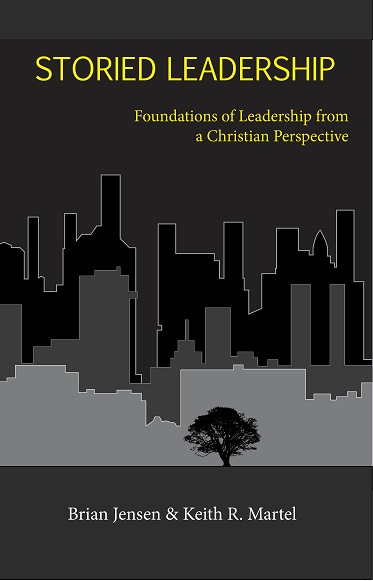 Storied Leadership: Foundations of Leadership from a Christian Perspective Keith Martel & Brian Jensen (Falls City Press) $18.00 Okay, this one isn’t brand new, and we promoted it when it first released early last spring. But I wanted to start off with it as it is a very good, truly delightful, brief survey of what some call “the Biblical meta-narrative” and how that big picture of the unfolding plot lines of the Bible can and should shape our views of reality. Without using the word “worldview” this offers a foundational Christian view of life, out of which can come a Christian view of society and subsequent social imaginaries. And yes, out of all that can bubble up a coherently Christian view of what leadership is and what it looks like. The chapters are short, the writing crisp, the insights profound. I think it is a really good entree into thinking faithfully and learning new ways to practice faith and leadership in the real world. We recommend it for students, for those new to this topic, and I am sure that experienced leaders will be glad to review it, being struck by notions such as “Kingdom Collaboration” and (with a nod to Steve Garber) “Proximate Leadership.”
Storied Leadership: Foundations of Leadership from a Christian Perspective Keith Martel & Brian Jensen (Falls City Press) $18.00 Okay, this one isn’t brand new, and we promoted it when it first released early last spring. But I wanted to start off with it as it is a very good, truly delightful, brief survey of what some call “the Biblical meta-narrative” and how that big picture of the unfolding plot lines of the Bible can and should shape our views of reality. Without using the word “worldview” this offers a foundational Christian view of life, out of which can come a Christian view of society and subsequent social imaginaries. And yes, out of all that can bubble up a coherently Christian view of what leadership is and what it looks like. The chapters are short, the writing crisp, the insights profound. I think it is a really good entree into thinking faithfully and learning new ways to practice faith and leadership in the real world. We recommend it for students, for those new to this topic, and I am sure that experienced leaders will be glad to review it, being struck by notions such as “Kingdom Collaboration” and (with a nod to Steve Garber) “Proximate Leadership.”
And that is just the first half.
The second part of Storied Leadership includes a good handful of specific skills or habits that good leaders will embrace. From learning to manage expectations to daring to be “disarmingly honest” to working through conflict with a vision of restoration, mentoring others to networking to learning the rhythms of rest, the second half of this fine, small book will help you dig in and start doing new stuff, making a difference right where you are. I love it. You should buy a few, ready to hand them out to up and coming folks you may be guiding or leading.
By the way, this is the first book from a very small, indie press that Martel and his wife started out of their Beaver Falls, Pennsylvania, home. Look for a new book from them launching mid October called Unleashing Opportunity: Why Escaping Poverty Requires a Shared Vision of Justice, a passionate and well written study of domestic poverty, the scandal of check-cashing scams and unjust lending practices, and how to help overcome the problems of the poor. It is co-authored by the CEO of the Center for Public Justice, Stephanie Summers, the always-eloquent Washington Post op-ed columnist Michael Gerson, and Katie Thompson of the on-line journal and movement Shared Justice. I have read the manuscript and am very, very eager to sell it, once it releases in a few short weeks.
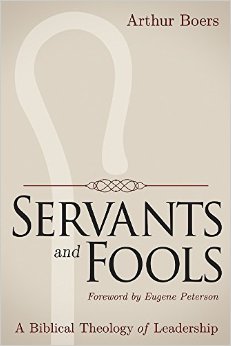 Servants and Fools: A Biblical Theology of Leadership Arthur Boers (Abingdon) $19.99 There aren’t many, but maybe a small handful of good books that deconstruct the standard-fare, worldly ways of thinking about leadership, books that move away from power and maneuvering, or technique and control, or benign use of communication skills. In contrast, there are many books offering to Christians standard fare management stuff with a gloss of religiosity on top, books full of promises about success and influence. Some are for Christians serving in the work-world, and some are for pastors or church leaders. Some have even adopted the once-revolutionary phrase “servant leadership” and have tweaked that to be about crass power or manipulation and the metrics of efficiency. For pastors trying to see more clearly the pretenses and dangers of this, and to discern a more pastoral view of their work, Eugene Peterson has of course been the most significant voice. His quartet of books on “vocational holiness” (at least Under the Unpredictable Plant and Working the Angles) are essential. As in most of his books, he gently but directly exposes how the ways and means of following Christ and leading a God-centered life is quite counter to the ways and means of typical North American life.
Servants and Fools: A Biblical Theology of Leadership Arthur Boers (Abingdon) $19.99 There aren’t many, but maybe a small handful of good books that deconstruct the standard-fare, worldly ways of thinking about leadership, books that move away from power and maneuvering, or technique and control, or benign use of communication skills. In contrast, there are many books offering to Christians standard fare management stuff with a gloss of religiosity on top, books full of promises about success and influence. Some are for Christians serving in the work-world, and some are for pastors or church leaders. Some have even adopted the once-revolutionary phrase “servant leadership” and have tweaked that to be about crass power or manipulation and the metrics of efficiency. For pastors trying to see more clearly the pretenses and dangers of this, and to discern a more pastoral view of their work, Eugene Peterson has of course been the most significant voice. His quartet of books on “vocational holiness” (at least Under the Unpredictable Plant and Working the Angles) are essential. As in most of his books, he gently but directly exposes how the ways and means of following Christ and leading a God-centered life is quite counter to the ways and means of typical North American life.
One of Eugene Peterson’s (somewhat) younger friends and allies has Arthur Boers, a long-time Mennonite pastor who was recently ordained as an Anglican priest. I have read several of Boer’s books (most recently the very generative study blending the critical insights about technology from the Catholic philosopher Albert Borgman and classic spiritual formation practices to come up with a brilliant book called Living Into Focus: Choosing What Matters in an Age of Distraction.) Boer has written on conflict resolution and spirituality and daily discipleship for decades, and is now a professor at Tyndale Seminary in Toronto. This brand new book opens with a fabulously fascinating foreword by Pastor Peterson where he says “this is by far the best treatment that I have ever come across on this much-discussed feature of church life in changing times.” And nicely assures us, too, that “Arthur is both generous and discerning, having lived deeply and well what he is writing for us.”
Another passionate prophet against Christian writers accommodating themselves to the customs and assumptions of North American leadership gurus is Marva Dawn (who has also co-written with Peterson.) She says of Boers (not surprisingly, since, although Lutheran, Marva has been influenced by the Mennonite and Anabaptist tradition) “Arthur Boers punctures all pretensions, unveils delightful discoveries, and exhibits perceptive insights. Servants and Fools is the most potent book on Christian leadership!”
Even Will Willimon, who himself has written extensively on leadership says “Arthur Boers has written the book we have sorely needed, a book that is destined to become the main text in my seminary courses in church leadership. Boers underscores the joyful peculiarity of Christian leadership. His book is unique: a biblically-based, christologically-grounded defense of leadership in the name of Christ.”
So there’s that going on.
By which I mean this isn’t a lovely meditation or an encouraging handbook of how to get stuff done. This is serious, upsetting, challenging – and joyfully peculiar – study of power and leadership in the Bible and in Jesus, especially.
Boers has been working on this for years, and his wide reading and study is evident. His own work draws much upon those situated on the margins, although the Harvard Business School scholars show up sometimes, too. (As do a few good lyrics from a few good songs of Bruce Cockburn!)
 You see, Boers is aware that much of the Bible, carefully read, is a critique of worldly power. (Just for instance, he cites Daniel Berrigan’s poetic and powerful commentary on Kings who notes “David dies intemperate, transfusing his venom into the veins of his son.” Of course he cites Walter Brueggemann, including his article “The Prophetic Leadership: Engagement in Counter Imagination” and much more. That most leading characters in the Bible are fraught with moral ambiguity should be better known and acknowledged among us, especially by those who swipe episodes out of context to give us a “Biblical” view of leadership success. It shouldn’t take one shaped by the faith of the Mennonites (but maybe it does) to remind us how uniformly badly the Biblical kings are described, and how Jesus brings us an “upside down kingdom.” This book powerfully explore the meaning of Biblical service and sacrifice, reversing much of what we think leadership is about. He isn’t the first to say this, of course (think Jacques Ellul or William Stringfellow, just for starters) but Boer brings a lot together in fresh ways, making this a truly remarkable, hard-hitting work.
You see, Boers is aware that much of the Bible, carefully read, is a critique of worldly power. (Just for instance, he cites Daniel Berrigan’s poetic and powerful commentary on Kings who notes “David dies intemperate, transfusing his venom into the veins of his son.” Of course he cites Walter Brueggemann, including his article “The Prophetic Leadership: Engagement in Counter Imagination” and much more. That most leading characters in the Bible are fraught with moral ambiguity should be better known and acknowledged among us, especially by those who swipe episodes out of context to give us a “Biblical” view of leadership success. It shouldn’t take one shaped by the faith of the Mennonites (but maybe it does) to remind us how uniformly badly the Biblical kings are described, and how Jesus brings us an “upside down kingdom.” This book powerfully explore the meaning of Biblical service and sacrifice, reversing much of what we think leadership is about. He isn’t the first to say this, of course (think Jacques Ellul or William Stringfellow, just for starters) but Boer brings a lot together in fresh ways, making this a truly remarkable, hard-hitting work.
The first part of this mature book is called “Christians and Contemporary Leadership Fascinations.” You can see why Peterson commends it. The second part is “Reflecting Biblically on Leadership” and is the heart of the book – there is lots of close reading and provocative interpretation, well worth spending time with, whether you are particularly interested in leadership or not. In the important third section of four chapters, Boers offers “Constructive Suggestions toward a Contemporary Theology of Leadership.” I jumped ahead to the last chapter where he provocatively asks if we “want to be in that number” and if that means extolling “heroes or saints”? You can guess his important answer.
Servants and Fools: A Biblical Theology of Leadership really is a remarkable study, drawing on significant Biblical scholarship, Jewish and Christian, classic and contemporary, and he writes with both prophetic fire and a bit of wit. (One chapter title on Jesus playfully alludes to Peterson’s most famous book, which was drawing on Nietzsche: “A Long Rebuke in the Same Direction.”)
David Gill, Professor of Workplace Theology and Business Ethics at Gordon-Conwell says “Servants and Fools is brilliant and essential…. I can’t imagine ever teaching another class on leadership without assigning and discussing this book.”
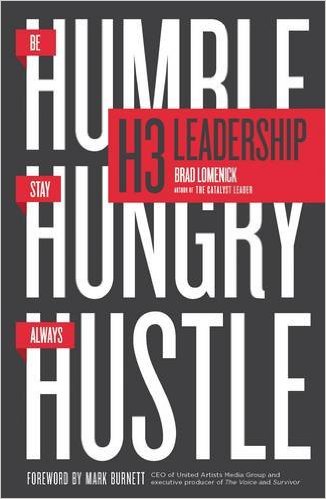 H3 Leadership: Be Humble, Stay Hungry, Always Hustle Brad Lomenick (Thomas Nelson) $24.99 Well, this could be, at first glance, an example of some of what Art Boers finds so troubling, a rather glitzy and upbeat view of leadership, with language of going on a noble quest, pushing boundaries, being passionate and such, but not related to the Bible much, let alone the subversive and counter-cultural ways of Jesus. It is marketed, as is his legendary Catalyst conferences, with whiz and bang — I love the cool, striking hardback design sans cover.
H3 Leadership: Be Humble, Stay Hungry, Always Hustle Brad Lomenick (Thomas Nelson) $24.99 Well, this could be, at first glance, an example of some of what Art Boers finds so troubling, a rather glitzy and upbeat view of leadership, with language of going on a noble quest, pushing boundaries, being passionate and such, but not related to the Bible much, let alone the subversive and counter-cultural ways of Jesus. It is marketed, as is his legendary Catalyst conferences, with whiz and bang — I love the cool, striking hardback design sans cover.
So, hmm. I was inclined to be skeptical.
As with his last book (The Catalyst Leader: 8 Essentials for Becoming a Change Maker) Lomenick won me over with his raw honesty, his serious experience, and his clear passion for teaching us what he has learned in ways that are exciting, clear, and actionable. I appreciated that he started H3 with his own story of nearly burning out, needing to take a break, of being hungry for something different — something more — in his life. (Ahh, if only we all had the opportunities and freedom to take a sabbatical and come up with big plans!)
Lomenick had developed quite a team of young and creative leaders in his Catalyst movement, and that in itself speaks volume — he had friends and associates and teammates and could create an exit strategy knowing good folks were in line to carry on the work he had poured his life in to. His time of discontent proved fruitful, and he eventually found himself pondering these three mantras, around these three words: humble, hungry, hustle.
And he had to start with one of the big ones: identity. Most leaders, he tells us, are mission focused and eager to get things done. Such driven people can soon forget who they themselves are (and their projects or organizations become “ships without a captain” running like ghost ships.) His world and style are very different then my own, but I was deeply, deeply moved by this portion, and it drew me in.
Under each of his three major mantras he listed the most important habits that embody and deepen those traits. He ended up with twenty key habits and they “reestablished for me my core leadership foundation. These are habits that will provide the practical playbook for the next thirty years of my leadership journey. Ironically, these are habits that all great leaders have in common.”
I like books that find patterns in things, that see how these characteristics work together to form traits and habits. Of course, I am mostly drawn to the sort Boer wrote, more philosophical and foundational, but when I find a more application and real-time guidebook, I sometimes can get very excited. This book not only examines and explores the key habits, but he challenges us to do something to make these things work for us. He is passionate about passing on this information, and on almost every page you can feel it. Don’t read this book of you want an armchair rumination or abstract treatise. Do read it if you want some Good to Great author Jim Collins says on the back cover “There is no better path to social improvement then deploying legions of exceptional leaders into the teeth of our most-pressing problems.”
The other endorsements on the back of H3 Leadership are pretty remarkable, all glowing tributes about Lomenick and his work, offered by some of the most recognizable names in this field. Blake Mycoski (TOMS Shoes), Seth Godin, Jim Collins, John Maxwell, Dave Ramsey, TV guy Mark Burnett. Broadcast journalist, producer and philanthropist Soledad O’Brien says “H3 Leadership makes a case for every leader, at every level,” in ways that will “make leadership better and last longer.” As you can tell, these are not pastors or churchy types, but social entrepreneurs and cultural creatives and people doing good work which is not ministry as such.
I am a fan of Brad Lomenick’s first book, and I am sure I will be a fan of this one. But here’s the thing: it doesn’t do anything at all what Art Boers does in Servants and Fools. Read them in tandem, I’d say.
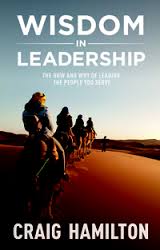 Wisdom In Leadership: The How and Why of Leading the People You Serve Craig Hamilton (Matthias Media) $24.99 In our effort to curate a selection here that brings fresh and sometimes harder-to-find books to the shelves, we discovered this new work from an evangelical Australian publisher. We have appreciated their clarity about outreach and creating fun resources that are contemporary and doctrinally solid. As a publishing venture they are all about the first things of the gospel, and, if I might, could call them a “gospel-centered” ministry. Their practical books are intense with a robust blend of usable guidance while pointing readers to the cross of Calvary and the finished work Christ accomplished in his death and resurrection. So I was eager to see what kind of a book they’d create.
Wisdom In Leadership: The How and Why of Leading the People You Serve Craig Hamilton (Matthias Media) $24.99 In our effort to curate a selection here that brings fresh and sometimes harder-to-find books to the shelves, we discovered this new work from an evangelical Australian publisher. We have appreciated their clarity about outreach and creating fun resources that are contemporary and doctrinally solid. As a publishing venture they are all about the first things of the gospel, and, if I might, could call them a “gospel-centered” ministry. Their practical books are intense with a robust blend of usable guidance while pointing readers to the cross of Calvary and the finished work Christ accomplished in his death and resurrection. So I was eager to see what kind of a book they’d create.
I have not worked much with this yet, but I’ll say this much: although it is almost 500 pages, the type is not small, so it is nicely usable, and maybe not as daunting as it appears.
Secondly, it does not engage – positively or negatively – with much contemporary leadership scholarship. It cites Patrick Lencioni and Bill Hybells and John Kotter’s Leading Change a time or two, but it simply isn’t that kind of a book. Wisdom in Leadership covers tons of topics and much ground — there are 78 short chapters! A handful of the chapters (maybe a fifth of them) will be of particular interest to those who are tasked with leading teams. It is clearly written for folks in the church.
And I mostly like this promo paragraph, which drew me to it in the beginning:
It often seems like there’s a choice to be made for those engaged in Christian ministry: to be a Bible-and-theology person or a leadership and management person. You either read books by John Stott or you read books by John Maxwell. Craig Hamilton definitely saw himself as a Bible and theology person. In fact, he still does.
But he also noticed that when groups of people get together in God’s world they function in certain predictable ways that he could learn from and harness for their benefit and for the flourishing of the world around.
Hamilton does seem to have a discerning and working knowledge of the sociology of people, how change and transformation happens, and how secular management principles can be redeemed from their “godless, faithless pragmatism.” He has obviously considered this carefully and with a desire to be faithful. In Wisdom in Leadership he seems to apply these learnings to doing ministry in the church or para-church, whether one is a pastor, paid staff member, or volunteer. It looks sane and practical and wise. It is theologically-inspired, conventionally evangelical and tilting Reformed, I gather. I know some of our readers will appreciate it a lot.
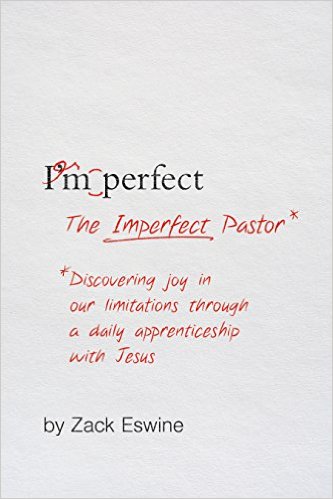 The Imperfect Pastor: Discovering Joy in Our Limitations Through a Daily Apprenticeship with Jesus Zack Eswine (Crossway) $16.99 This brand book on being a pastor just came yesterday and while it is not about leadership, generally, it certainly seems to fit this little list now, so I have to announce it. Heck, I don’t think it would matter what this list was, I’d want to name this now: he is a really, really good writer, and we should read whatever he has to say.
The Imperfect Pastor: Discovering Joy in Our Limitations Through a Daily Apprenticeship with Jesus Zack Eswine (Crossway) $16.99 This brand book on being a pastor just came yesterday and while it is not about leadership, generally, it certainly seems to fit this little list now, so I have to announce it. Heck, I don’t think it would matter what this list was, I’d want to name this now: he is a really, really good writer, and we should read whatever he has to say.
You may recall his last big book called Sensing Jesus: Life and Ministry as a Human Being which Jerram Barrs said “is one of the finest books on being a pastor written in this generation.”
I liked Ray Ortlund’s lovely endorsement, that goes like this:
C.S. Lewis wrote that friendship is born when one man says to another, ‘What! You too? I thought that no one but myself…’ Many pastors will find a new friend in this remarkable book. To everyone who wants to serve the Lord with a heart set free from pretense, I commend Sensing Jesus.
Well, The Imperfect Pastor: Discovering Joy in Our Limitations… which examines not just our humanness, but our brokenness — “limitations” as the subtitle discreetly puts it — seems almost like a sequel. What he starts in Sensing he brings to fuller flower in Imperfect. My, my, this is good, rich, honest stuff.
Ken Shigematsu (who wrote the fabulous spiritual formation book God in My Everything) says “This is simply the best book on pastoral ministry I have ever read.”
Mark Galli, Editor-in-Chief of Christianity Today says of Eswine,
No one today shows more insight into the perils and joys of everyday ministry in the local church — a refreshingly honest and beautifully written meditation.
One of the best books of cultural criticism I’ve seen this year is A Wilderness of Mirrors: Trusting Again in a Cynical World (which I raved about a few months ago, noting that it is mostly about cynicism in our “whatever” culture.) He writes,
I wish I’d read this book twenty-five years ago when I first began to consider pastoral ministry. The ground Zack covers is vital for novices and senior pastors alike.
I am not a pastor and I am not even sure I can be called a typical leader; I don’t really do ministry as I am a shop keeper and businessman. But I intend to read this and I am sure I will savor it. It invites us to a deeper walk with Jesus, to a realization of our needs and limits, and a desire to allow Christ to apprentice us into His ways, even though difficulties.
Wendy Der says his personal stories of his own ups and downs will “challenge and encourage anyone who seeks to minister in the name of Jesus.”
By the way, you gotta love a book that alongside Mary Oliver and Gerard Manley Hopkins cites Charles Spurgeon and Annie Dillard, Wendell Berry and Richard Baxter, Acedia and Me by Kathleen Norris and No Little People by Francis Schaeffer. Kudos, Zack for not only bringing an honest, human and humane approach to pastoral leadership, but for making it so darn interesting.
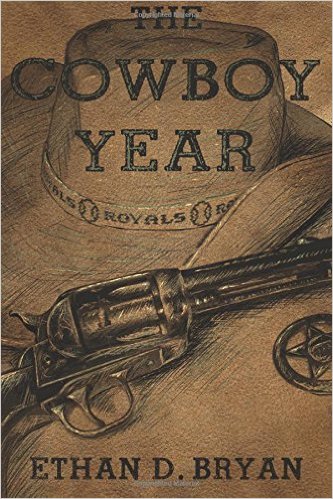 The Cowboy Year Ethan D. Bryan (Electio Publishing) $16.99 I mentioned something about curating an interesting selection here at our bookstore? Well, I wanted to offer a bit of a curve-ball here in this list, a surprising one. This father-and-son memoir is not, at first blush, about leadership. Or is it?
The Cowboy Year Ethan D. Bryan (Electio Publishing) $16.99 I mentioned something about curating an interesting selection here at our bookstore? Well, I wanted to offer a bit of a curve-ball here in this list, a surprising one. This father-and-son memoir is not, at first blush, about leadership. Or is it?
You may know Ethan Bryan’s books as I have touted them here before. I adored his Run Home and Take a Bow about going to a season’s worth of Kansas City Royals baseball games, often with his young daughters. His Catch and Release is a well told story about playing games of catch (sometimes with the famous, sometimes with the hapless — he almost came here to have a game of catch in a bookstore! ) in order to raise money to release captives of child slavery and sexual trafficking, giving funds to the abolitionist organization Not for Sale. He is a sports fan, a wholesome family man, a musician and creative worship leader and one who practices his craft of writing, doing his art, telling his stories, giving his life away to others. He got himself fired from at least one church job, so I don’t know if he’s much of a leader.
He did travel around doing free concerts for social justice and got people to sign his guitar, and wrote a book about it, a lovely, inspiring, low-key Tales of the Taylor. Who does stuff like that but one who has some curious leadership DNA coursing through his veins? Maybe what Professor Boers would call a “servant and a fool” perhaps? Indeed.
And a Biblical fool testifies, creatively, and in so doing, invites people — as Donald Miller and Bob Goff have famously put it — “to tell a better story.” And in storytelling, conjuring up episodes of his own life and putting them on paper, Ethan Bryan gets readers inspired to make something different of their own lives. If that isn’t a form of culture-making, of servant leadership, I don’t know what is.
And so, this newish book, a book I announced a while ago, but never really promoted adequately.
You see, Ethan never shot a gun more than a time or two in his life. He’s a progressive sort of Baptist, earnest, peaceful, kind. And his dad, who in this book he calls J-Bar, is a multi-state cowboy action shooting champion.
What is a multi-state cowboy action champion, you ask?
Well, Ethan, too, wants to find that out. He felt compelled to take a risk and try something completely new (as he puts it) and joined his father in this thing — apparently it is a thing, at least out West — of competing in a cowboy re-enacting contest which, yes, involved shooting. And buying Stetson hats.
Bryan writes, “Competing under the alias “Fret Maverick,” I was introduced to a slice of Americana I would have never known otherwise. The Cowboy Year is a quirky and beautiful, Midwest-set, father-and-son memoir.”
But ultimately, he tells us, “The Cowboy Year is a story about having the courage to tell new stories.”
Ethan is widely read and uses a lot of good quotes to lead off his chapters. One, called “changing lead dogs” (there’s a leadership principle in there somewhere, I’m sure) he quotes the famous Gary Paulsen and his beloved book about the “fine madness of running the Iditarod” who wrote “I do not hold the record for the person coming to disaster soonest in the Iditarod. But I rank close.”
Things do go wrong in this book, in these games, and in these new sorts of conversations he is having with his father and his cowboy subculture. It isn’t easy, always, and it isn’t all sweet kinship. There are conversations about handguns and domestic violence and global injustice. It is funny and serious and ends up being quite a stirring narration. It is about facing fears, about making new friends (which, Ethan says, wisely, “matters immensely.”) It is about forming relationships as a way of getting around sticky political differences.
In one moving scene, Bryan recounts hearing the mother of one of the children killed in a now famous mass shooting tragedy. He recalls the beauty of her transcending culture wars rhetoric and “sides” of the gun control debate by inviting people to be in real relationship with friends, neighbors, strangers, children. It was deeply moving, jarring, even, in a book about different kind of firearms, making old fashioned ammunition, and doing dude ranch kinds of cowpoke things. You see, Ethan is a justice activist and a baseball fanatic, but dressing up in cowboy gear and shooting wasn’t his culture, wasn’t his comfort zone. But he forged into new arenas, and made new friends, and realized the power of risk, the power of relationship, the power of story.
That, too, is a good part of leadership. Who knew?
We show the regular retail price, but will gladly offer a 20% discount off any that you order. Just click our link to the secure order form page — we’ll confirm everything in a reply email. Easy.
As always, thank you very much for reading our reviews and sending orders our way. We are gr
ateful.
BookNotes
DISCOUNT
ANY ITEM MENTIONED
20% off
order here
takes you to the secure Hearts & Minds order form page
just tell us what you want
inquire here
if you have questions or need more information
just ask us what you want to know
Hearts & Minds 234 East Main Street Dallastown, PA 17313 717-246-333
